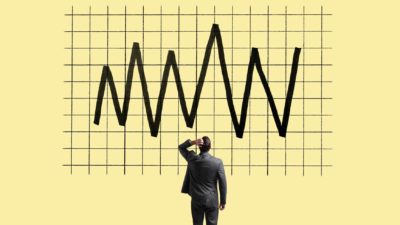Here's a headline you won't read anywhere else but here:
"NASDAQ soars 17%"
You also won't read this:
"Sydney house prices up 6.7%"
Both are true, at least according to Yahoo Finance and The Guardian, respectively, only I had to search for the data.
You see, most of the headlines you'll read are more focused on the most recent moves, or on falls from recent peaks.
Both of those would-be-but-won't be headlines above are over two-year periods.
Yes, the NASDAQ is down 19% (or so) from its recent peak. And Sydney house prices are down 11.1% compared to last year.
So both sets of data are correct, but the message is very different.
Is the stock market really down? Yes. And no.
Have house prices fallen? No. And yes.
So why do we only seem to care about one data set — the recent, large, falls — and not the other?
The honest answer is 'I don't know'. I mean, I know why we do it these days: Because we always have.
But why did we start doing it that way?
It makes sense on one level. After all, news has always has a recency bias. Fair enough — "tell me what just happened".
As I've said before, I don't blame the journos and editors… if we didn't read it, they wouldn't write it.
But why do we care?
If the immediate past was predictive, I could understand it.
If we'd bought our entire portfolios in one go and at the peak, I would get it.
But if you've been building a portfolio for years, does the peak matter?
If you're going to be adding to your portfolio for years to come, does the fall matter?
I'd wager the answer is a very simple 'no'.
If I was going to dig deeper for reasons, it's a little to do with how our brains process these sorts of market movements.
As share prices rise, they tend to do so slowly. And we give ourselves credit for it, not asking why they've gone up so much.
When they fall, they tend to fall sharply. And the pain of the loss has us (subconsciously) looking for somewhere to lay the blame.
Is it fear? Greed? The psychological trap known as 'attribution bias'?
Yes. In all likelihood, it's all three.
Here's Exhibit A: Have you seen the number of people jumping on the 'Apple is dead' bandwagon in the last couple of days? The opinions have come thick and fast, written often with a self-assured sense that it was always obvious.
But was it? Or is it a case of people letting the market tell them what they should think?
To be clear, I don't mind people asking the question. Or wondering. But the confidence with which the negative articles are being written — after a single quarter of poor sales — should tell you something. To work out what, ask yourself how many of those experts were writing the same thing just before the earnings downgrade.
And you know what? Human nature means most of us will see the downgrade, read the articles, then start to believe the same thing.
Maybe they're right. Maybe Apple's glory days are in the past. Maybe we are at peak smartphone.
So what?
No, that's not a rhetorical question. Because even if we are at peak smartphone, Apple could still be a good investment. It's trading at 11 or 12 times trailing earnings. At that level, it's valued about the same as our banks — and it has fully one-sixth of its market cap in cash.
See, there's a difference between a company and a stock. Or, more accurately, there's no difference, but the price you pay determines your result. If Apple never grows again, there's a price — probably lower than today's — that would still be worth paying.
If growth is slow-to-moderate? Then it's probably fair value. And if this quarter is an anomaly? Or if it finds another way to grow? Then it's probably cheap.
So, as long-term investors, what's the right headline for Apple's current troubles? Or the NASDAQ? Or house prices?
I don't know, but the better question is 'What's the rest of the story?'
Our human brains struggle with nuance and detail when presented with stark, near-term news. It's hard to keep long-term returns in our minds, so when the Apple share price falls 10%, most of us can't contextualise it.
For the record, Apple's share price has doubled over the last 5 years. It's up almost 5-fold in 10 years. You won't read those headlines, either.
And after the recent falls — of around one-third since early October — you can look at it one of two ways: either it's a terrible investment because the price has fallen… or it's now selling for 33% off.
The hard part? We won't know for a few years. Such is the lot of investors, who accept uncertainty for the potential of strong, long-term compound returns.
Foolish takeaway
For my part, I doubt this is Apple's last act. And even if it never regains the sort of growth it enjoyed in recent years, I don't see many Apple fans abandoning their devices.
Meanwhile, they keep using iTunes and the App Store, and Apple keeps taking its cut. Whether Apple is a great investment or a value trap from here, reports of the company's death are, as in the case of Mark Twain, greatly exaggerated.
Equally, if you bought a Sydney house or units in the NASDAQ ETF a couple of years back, you're still doing nicely.
As investors in shares, most of us will continue to add money regularly to our investment accounts. And if you're living from your portfolio, as long as you've put 3 years of living expenses away in cash, this volatility is just an annoying (and sometimes worrying) sideshow.
Death, taxes and volatility are certainties. Don't buy into the short-termism — stay focused on the horizon!








